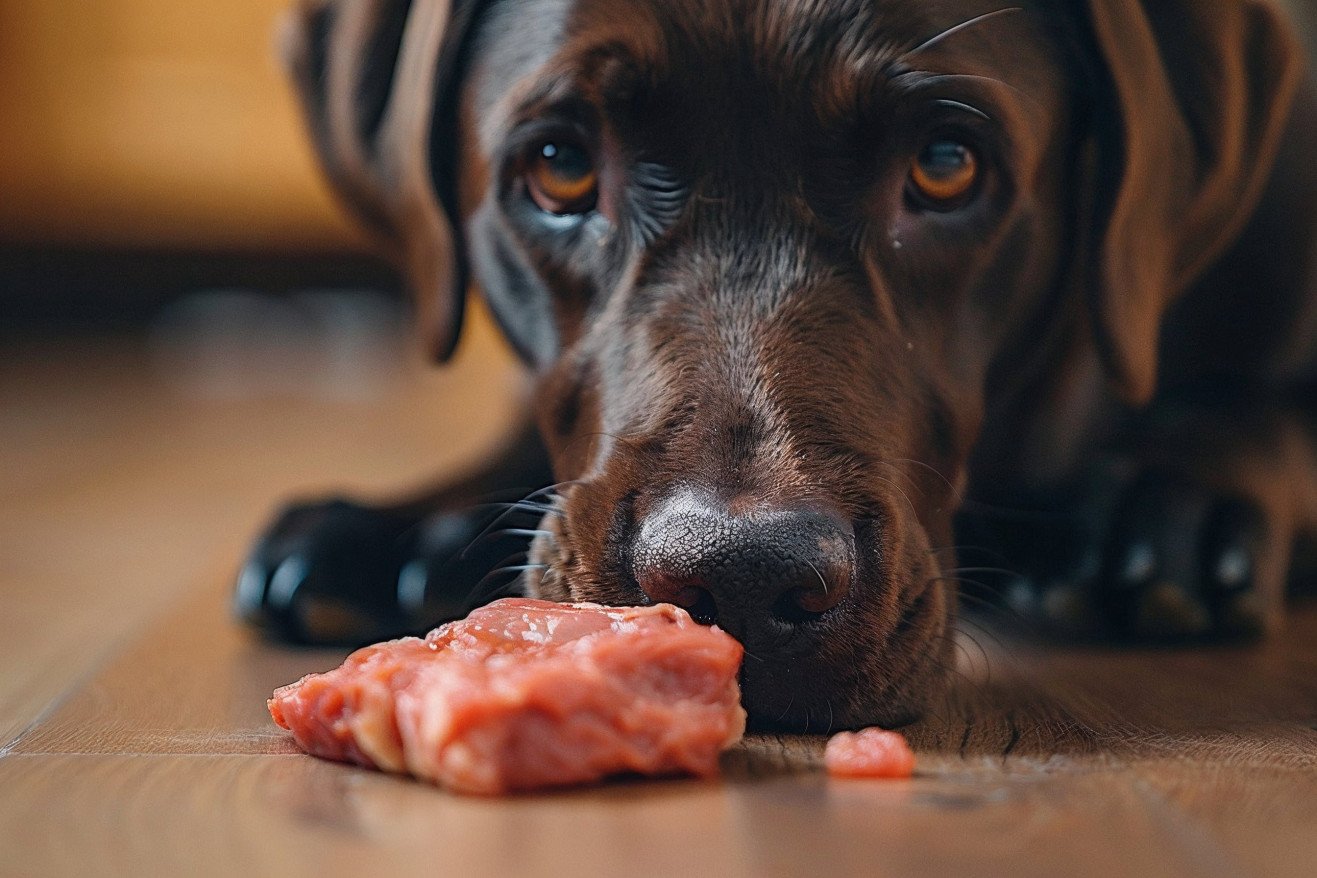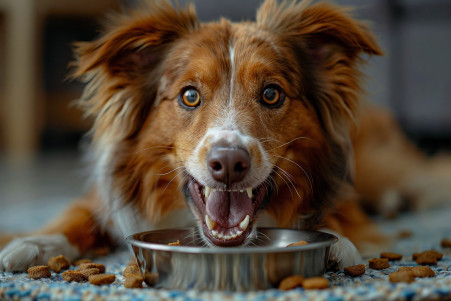Can Eating Raw Meat Cause Aggression in Dogs? Effects on Canine Behavior
14 May 2024 • Updated 13 May 2024

Raw food diets have been associated with a number of potential behavioral problems, including aggression, but is there any truth to the idea that feeding dogs raw meat can make them more aggressive? While raw food diets can result in nutritional imbalances that can affect behavior, the idea that raw meat can cause aggression in dogs is a myth - aggression is more likely to be caused by other factors, such as lack of training and socialization.
To learn more, this article will review the scientific evidence on the effects of raw food diets on dogs, as well as other common causes of aggression. By learning the real causes, you can help ensure that you're addressing any unwanted behaviors with the right nutritional, training, and environmental interventions to help your dog be as well-adjusted as possible.
Can eating raw meat cause aggression in dogs?
Aggression in Dogs Has Many Causes
Aggression in dogs is a complex behavior that has many causes beyond diet. According to The Spruce Pets, some of the most common causes of aggression are fear, anxiety, resource guarding (like food or toys), lack of socialization, and medical problems or pain. In addition, there are many factors that can increase the risk of aggression, including a dog's age, sex, breed, and living situation.
It's also important to note that there are many different types of aggression, and each may need to be treated differently. Some of the most common types of aggression are fear-based, territorial, possessive (resource guarding), and maternal aggression, according to VCA Animal Hospitals. In addition, a study from the University of Helsinki found that the idea of "dominance" in dogs is outdated and that aggression is more often the result of emotional states like fear than a desire for "pack leadership."
A systematic review explains that while diet can have an indirect effect on behavior through nutritional imbalances, aggression is more often caused by a lack of socialization, genetics, medical issues, and welfare needs. To make sure that you're addressing the root cause of your dog's aggression, it's important to get a professional evaluation that can help you determine the type of aggression and its cause. Focusing on diet without addressing other causes is unlikely to help if your dog's aggression is deeply rooted.
How to Train and Manage Aggressive Dogs
Aggressive dog training and management is a multi-faceted process that involves more than just dietary changes. According to VCA Animal Hospitals, the first and most important step is to make sure that the dog and the people in the household are safe. This may mean using management devices like crates, muzzles, and head halters to prevent access to situations that may trigger aggression and to prevent biting during training.
A certified animal behaviorist or trainer will need to be brought in to create a behavior modification program that will work. As Petcube explains, this will likely include positive reinforcement training methods like desensitization and counter-conditioning to deal with the underlying issues that are causing the aggression, like fear and anxiety. It's also important to establish a leadership role using positive reinforcement methods, and to make sure that you're patient and consistent.
In some cases, a veterinarian may prescribe medication to help with anxiety and make training more successful. However, as Petful points out, the earlier that aggression can be dealt with through socialization and training, the better the chance of success.
Dealing With the Health Risks of Raw Meat Diets
While raw meat diets may not be a direct cause of aggression in dogs, they do come with a number of health risks that dog owners should be mindful of. Research has shown that raw pet foods are more likely to be contaminated with bacteria that can cause disease, such as Salmonella and Listeria, than other types of pet food. The FDA reports that in a two-year study, 15 of 196 raw pet food samples were positive for Salmonella and 32 were positive for Listeria monocytogenes.
These bacteria can cause serious foodborne illnesses, including salmonellosis and listeriosis, in both pets and the people who handle the raw meat. VCA Animal Hospitals explains that dogs can also be asymptomatic carriers of these pathogens, which can be especially dangerous for immunocompromised people in the home. It’s important to handle, prepare, and store raw diets properly to reduce the risk of these health concerns.
In addition, a critical review published in the PMC found that there is evidence of nutritional imbalances and deficiencies in raw meat-based pet diets. While the potential benefits of raw feeding haven’t been well-researched, the potential risks are serious enough that veterinarians recommend that pet owners talk to them about these concerns before switching to a raw diet.
Why Early Socialization and Training Are So Important
Early socialization is essential to prevent fear and aggression in dogs. As the American Kennel Club explains, exposing puppies to a wide range of people, sounds, and experiences in a positive way can help them develop confidence and emotional control. This is particularly important because, as Hill's Pet points out, the behaviors dogs learn as puppies often stick with them into adulthood.
In addition to helping dogs learn how to behave, puppy training classes can also help with socialization. According to Petful, the earlier that aggressive behaviors can be nipped in the bud through training, the more likely it is that they can be overcome. This includes stopping aggressive play and teaching bite inhibition when dogs are still puppies.
Socialization and training need to be ongoing to help dogs maintain good behavior. As Hill's Pet points out, even if a puppy is raised to be comfortable around people, they can develop fears and phobias if they aren't continually exposed to new things in a safe, controlled way. By making sure that socialization is a priority when dogs are young and as they age, pet parents can help ensure that their dogs don't become aggressive.
Conclusion: Taking a Holistic View of Dog Behavior and Nutrition
While raw meat itself does not directly cause aggression in dogs, an imbalanced raw diet could potentially contribute to the issue. However, aggression is a complex behavior that is often the result of genetics, socialization, environment, and potential medical issues.
It is important to seek professional help, use positive reinforcement training, and address the root causes of aggression to effectively manage these behaviors. Raw diets also require careful handling and preparation to mitigate health risks from bacterial contamination.
Ultimately, a holistic approach that takes into account behavior, nutrition, and veterinary guidance is important to ensure the health and successful adjustment of canine companions.


